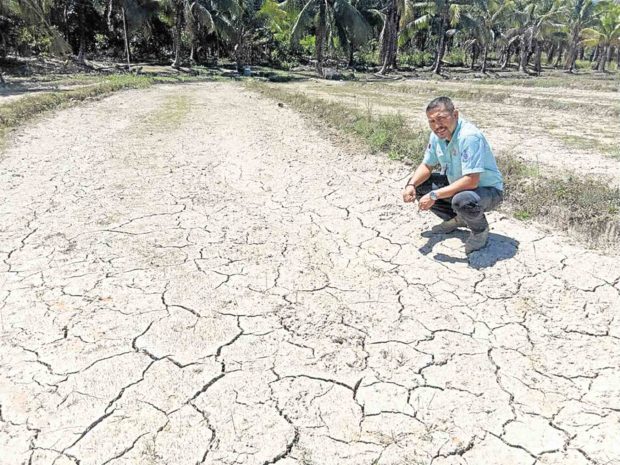
PARCHED FARM The prolonged dry spell has dried up farms and water sources in Kidapawan City. —WILLIAMOR MAGBANUA
KIDAPAWAN CITY — Water sources in at least 16 villages in this provincial capital of Cotabato, are starting to dry up, prompting the city government to ration water in a number of communities in four barangays severely affected by extreme weather.
Mayor Joseph Evangelista said deep wells, which supply water to the subvillages (sitio) of Nazareth, Quarry and Puas Inda at Barangay Amas; Andagkit at Barangay Kalaisan; Lika at Barangay Onica; and Balite and Talisay at Barangay Malinan, were empty, following the dry spell that hit these areas starting Feb. 18.
Evangelista said residents needed to walk at least 2 kilometers before reaching the nearest sources of water.
Indigenous peoples
“We need to supply potable water to them. It is sad to note that these areas suffering the effect of El Niño are where most of the indigenous peoples live,” he said.
Psalmer Bernalte, city disaster risk reduction and management officer, said three trucks carrying at least 10,000 liters of water were being sent to these areas every other day.
At least P31 million worth of crops had been destroyed in 16 of the city’s 40 villages experiencing drought, said Marisa Aton, acting city agriculturist.
Farm damage
In Barangay Maceboleg alone, at least 90 percent of rice fields were parched, while 80 percent of vegetable farms were damaged.
At least 50 percent of banana plantations in the eastern and western parts of Kidapawan were also damaged, Aton said.
She said the amount of agricultural losses could still go up as the city agriculture office was still monitoring other areas hit by the dry spell.
Hundreds of farm workers have lost their jobs, Aton said. “They are [calling for] a declaration of state of calamity so they can get assistance from the government,” she added.